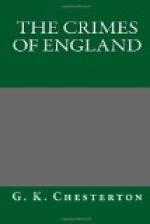But for Austria, and even more for Russia, there was this to be said; that the French Republican ideal was incomplete, and that they possessed, in a corrupt but still positive and often popular sense, what was needed to complete it. The Czar was not democratic, but he was humanitarian. He was a Christian Pacifist; there is something of the Tolstoyan in every Russian. It is not wholly fanciful to talk of the White Czar: for Russia even destruction has a deathly softness as of snow. Her ideas are often innocent and even childish; like the idea of Peace. The phrase Holy Alliance was a beautiful truth for the Czar, though only a blasphemous jest for his rascally allies, Metternich and Castlereagh. Austria, though she had lately fallen to a somewhat treasonable toying with heathens and heretics of Turkey and Prussia, still retained something of the old Catholic comfort for the soul. Priests still bore witness to that mighty mediaeval institution which even its enemies concede to be a noble nightmare. All their hoary political iniquities had not deprived them of that dignity. If they darkened the sun in heaven, they clothed it with the strong colours of sunrise in garment or gloriole; if they had given men stones for bread, the stones were carved with kindly faces and fascinating tales. If justice counted on their shameful gibbets hundreds of the innocent dead, they could still say that for them death was more hopeful than life for the heathen. If the new daylight discovered their vile tortures, there had lingered in the darkness some dim memory that they were tortures of Purgatory and not, like those which Parisian and Prussian diabolists showed shameless in the sunshine, of naked hell. They claimed a truth not yet disentangled from human nature; for indeed earth is not even earth without heaven, as a landscape is not a landscape without the sky. And in, a universe without God there is not room enough for a man.
It may be held, therefore, that there must in any case have come a conflict between the old world and the new; if only because the old are often broad, while the young are always narrow. The Church had learnt, not at the end but at the beginning of her centuries, that the funeral of God is always a premature burial. If the bugles of Bonaparte raised the living populace of the passing hour, she could blow that yet more revolutionary trumpet that shall raise all the democracy of the dead. But if we concede that collision was inevitable between the new Republic on the one hand and Holy Russia and the Holy Roman Empire on the other, there remain two great European forces which, in different attitudes and from very different motives, determined the ultimate combination. Neither of them had any tincture of Catholic mysticism. Neither of them had any tincture of Jacobin idealism. Neither of them, therefore, had any real moral reason for being in the war at all. The first was England, and the second was Prussia.




